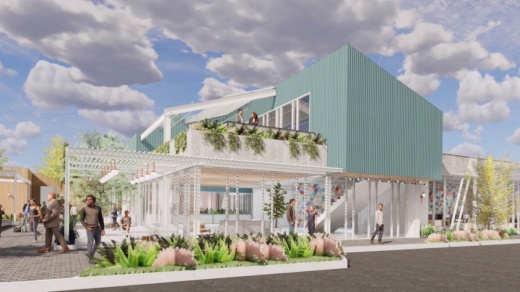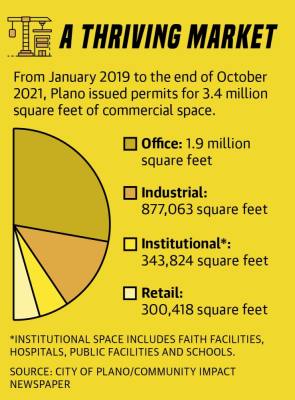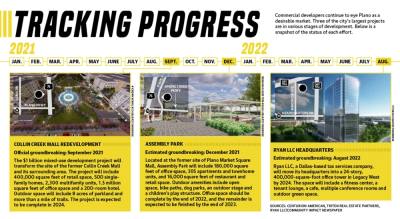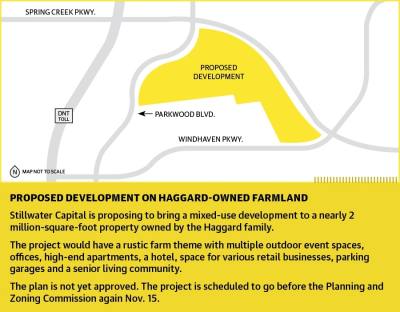Plano issued permits for 3.4 million square feet of commercial space between January 2019 and Oct. 31, 2021, according to data provided by the city’s planning department. The vast majority of the permits were for office space, per the data.
Developers still want to build in Plano, even amid uncertainties of the COVID-19 pandemic, the city’s Director of Special Projects Peter Braster said. But rising construction costs linked to supply chain issues are slowing the process down.
“What we are seeing is a little bit of delay getting the projects off the ground ... the costs have risen so much,” Braster said.
Anirban Basu, chief economist with Associated Builders and Contractors, said in an Oct. 12 nationwide report that “a growing number of contractors are indicating shortages of materials. Prices also continue to increase as global supply chain disruptions persist.”
Despite record-high costs to build, Braster said commercial projects in Plano are still worth the price because of the amount of jobs they produce.
“Economic development has always been jobs based and will continue to be,” he said.
While some companies have embraced remote work, Braster said he expects most to make a full return to the office.
“I don’t think there’s a doubt anymore that they’re coming back,” he said. “I think some of the more progressive companies might do [a few] days at home a week.”
Mayor John Muns said in a previous interview with Community Impact Newspaper that city officials must continue to make sure Plano is the kind of place where workers want to live.
“We want to make sure that we’re providing the amenities for our corporate community so they want to come here, be satisfied [here] and choose to remain here.”
New development
One of the latest additions to Plano’s commercial landscape is Ryan LLC, a Dallas-based tax services firm planning to occupy a new, 24-story office tower at Legacy West. Between 500-600 employees will be housed in the 400,000-square-foot space, company officials said. A groundbreaking for the building is scheduled in 2022, and the company plans to move in by 2024.
Maher Maso, principal with the firm, said the company wanted to maintain a foothold in the region.
“North Texas has been a home to Ryan for many years,” Maso said. “Plano and the surrounding cities have done a great job in attracting Fortune 500 and other corporations. It was a natural decision to relocate there.”
Once the Ryan headquarters is built, there will be only one parcel of land remaining for purchase in Legacy West, Braster said. He expects another office building will most likely end up there.
“I think the land is too valuable to do anything else,” he said.
Redevelopment projects
Just under 2,200 acres of land is left to develop in Plano, which is driving an uptick in redevelopment projects. A primary example is the $1 billion mixed-use development coming to the former site of Collin Creek Mall.
A groundbreaking event was held Sept. 24 for the project located just west of US 75 and north of Plano Parkway.
“We know the community is anxious to see development begin on this project,” City Manager Mark Israelson said during the groundbreaking event. “This has been a very complex project.”
Demolition of the mall and the surrounding area has been underway since 2019. Centurion American officials said some parts of the original structure will be preserved.
Braster said designing the project, finalizing costs and securing city finances all had to come together before construction could begin.
“You have to go down the line a bit until all those pieces come together,” Braster said. “We wanted to make sure ... we did not have a stalled project.”
The city of Plano expects to contribute $97 million to the project via revenue from a tax increment reinvestment zone as well as through various bonds. The rest of the project will be funded privately.
Another large-scale redevelopment effort is underway on the former site of Plano Market Square Mall. The project, now named Assembly Park, is slated to break ground before the end of the year, developer Triten Real Estate Partners announced in early October. It will be located at the corner of East Spring Creek Parkway and K Avenue.
Triten announced final acquisition of the former mall and the 26 acres of land on which it sits in late January. Plano City Council green-lighted a zoning change in December that allows for redevelopment.
Earlier this year, Plano Director of Planning Christina Day told Community Impact Newspaper the redevelopment project would address a need for quality restaurants and engaging spaces in the city’s eastern Oak Point area.
“It provides an opportunity to really change the look and feel of that area just east of US 75,” she said.
Potential future development
City staff has recommended the planning and zoning commission approve a request that would bring a mixed-use development to one of the last large plots of available land in the city.
The proposal is for a nearly 2 million-square-foot property owned by the Haggard family since the mid-1800s. It is located just south of Spring Creek Parkway and east of Parkwood Boulevard off the Dallas North Tollway.
Stillwater Capital is developing the project in partnership with Haggard Enterprises Limited.
The development would include a restaurant with locally sourced food as a main feature, according to a Sept. 20 presentation by Stillwater Capital.
Planning and zoning commissioners have voted to table the proposal twice. They are scheduled to vote on it again Nov. 15.
Several residents who live near the site have attended meetings to oppose the proposal. The number of multifamily apartments, increased traffic in the area and aesthetics of multiple parking garages were among their concerns.
Braster said he understands why nearby residents are against the project, but in a city like Plano, development is inevitable.
“A common reaction to proposed development on open land is, ‘no,’” he said. “I think at a basic level, people would rather have nothing because they are used to nothing [being there].”
David Barch, a 30-year Plano resident, said at the Oct. 18 meeting he believes the plan does not benefit nearby homeowners.
“The [commission] seems to subscribe to the ‘more is better’ philosophy,” Barch said. “Quite often more is not better. It’s just more.”
Braster said the amount of commercial development in Plano helps relieve some of the tax burden on residential property owners.
“[Commercial properties] are paying 50% of the taxes, but they don’t have anywhere near the same demand on city services,” Braster said.
Planning ahead
The future of development in Plano will be guided by the city’s comprehensive plan, which was approved Nov. 8 by City Council.
The plan is a long-term guide for the city that focuses on future growth, priorities, services and development in Plano, according to its official description. City officials have been following guidelines from the Interim Comprehensive Plan that was approved in 1986.
Once called the Plano Tomorrow Plan, the guide was voted down by council last year after residents voiced concerns that it was too focused on development and increased density.
As a result, more detail was added in areas related to land use, density, transportation and growth management, according to the city’s website.
Muns said the plan can always be amended down the line.
“It was always intended to be looked at every five years,” Muns said. “We just want to make sure that we’re giving the city and future [City Councils] ... the flexibility to make decisions on what the market demands.”
Olivia Lueckemeyer and William C. Wadsack contributed to this report.








